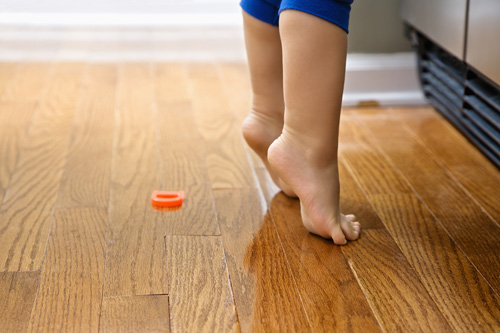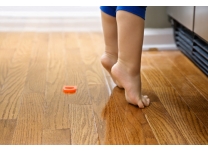Should You Worry If Your Child is a Toe Walker?

Does your child walk on his or her toes?
Tippy toe walking in babies and young children is very common, but prolonged toe walking often concerns parents who fear it may be symptomatic of other developmental problems. While it is recommended to refer to the advice of your doctor, a new study sheds some reassuring light on the subject.
Toe walking is just what it sounds like: walking on the balls of the feet and keeping the heels in the air. We see a lot of babies doing this in our workshop when they first learn to walk, and most stop after a few months. For some children, however, toe walking may continue for much longer and parents often wonder why. A Swedish study1 published in the August 2012 edition of Pediatrics magazine explored this topic by analyzing the walking patterns of 1,400 children.
It turns out that toe walking is common among healthy children. About 5% of children will toe walk at some time, especially under the age of three. Even at older ages many preschoolers still continue the practice and most—about half—will stop doing so on their own by age 5½. Those that continue past that age tend to do so only about 25% of the time, often out of habit.
The study did show a prevalence of toe walking among children with certain cognitive disorders, but experts say those cases also showed many other symptoms and toe walking by itself is common enough that parents should not see it as a reason for alarm. Often, children learn to toe walk from spending too much time in a baby walker during key developmental stages. Other times, it can be caused by a short or tight Achilles tendon, which makes it difficult to lower the heel while taking steps. There also appears to be a hereditary connection, as 70% of toe walkers come from families that include another relative who toe walked at some time.
Many pediatricians say tippy toe walking is a normal part of development that will usually resolve itself in time. If it continues into older ages, concerned parents may want to seek a doctor's opinion and will often be taught stretching exercises or similar treatments to help their child loosen Achilles muscles and improve posture. One thing is certain: toe walking should not cause alarm or excessive worry—healthy kids do it a lot.

Martin is a lifelong runner who began wearing minimalist shoes over 10 years ago when he found they alleviated his chronic foot pain, which eventually disappeared completely. He further studied proper running form through a series of workshops taught by Correct Toes inventor, Dr. Ray McClanahan DPM. Martin has collaborated with several health care professionals to collect and share peer-reviewed studies that show the benefits of minimalist footwear. In his personal life, Martin loves living in the Pacific Northwest because it allows him to enjoy a variety of outdoor activities year-round, including hiking, cycling, rock climbing, surfing and snowboarding.



I have seen documentaries about severely autistic kids walking tippy toes, don't think that is the case with me...
It is a bit of habit not to walk like that in public when wearing shoes though. Some people think it's weird.
At 7 years old he was serial casted to realign his ankles and feet. Over 6 weeks the casts were progressively changed to bring his heels back down, for him this was a painful process. It failed, and he gradually arched his feet back up and can no longer put his heels to the ground. Again spite of our efforts to prevent it.
Fast forward to 11 years old he's a bright boy and about to enter grammar school. He cannot walk properly and no shoes will stay on his feet. He has arched feet, very tight Achilles tendon and his knees are tight too. He constantly sprains his ankles and people treat him as if he is disabled.
He is under the care of specialists and has had nerve conduction tests and MRIs and is about to endure many operations to rebuild his feet.
His heels being off the floor give him easily an extra 3 inches in height. He will have his bones broken and tendons and ligaments stretched to flatten his feet to how they should be.
This is going to be a long painful process (again) but they are hoping to get it all done before he starts grammar so his schoolwork won't be affected as he has a very promising future.
As his mum obviously I feel responsible and wish we had done more for him or nagged more and tried harder. But as soon as my back was turned he would be up on his toes. He himself wants to change this now which is what was needed to sort it out.
So to any parent who is concerned about this and their children are over 5, definitely get them help. There is plenty that can be done including physiotherapy and serial casting.
Please share what type of doctor made your son's diagnosis? and what area of the US do live in?
Thank you so much for sharing,
JN